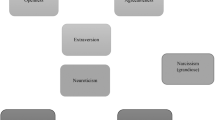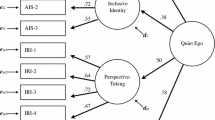Abstract
Eysenck originally postulated that extraverts would adopt tough-minded social attitudes, although psychoticism is now considered to be of greater importance than extraversion. Previous research has attempted to relate psychoticism to realism-idealism, a principal factor of the Wilson-Patterson Conservatism Scale, and a measure of tough-mindedness acceptable to Eysenck. Results have proved discrepant; authors have used psychoticism scales of uncertain item content and length. The present study examines the relationship between psychoticism, extraversion and realism-idealism, using the Eysenck Personality Questionnaire and the Wilson-Patterson Attitude Inventory. The results provide only weak support for Eysenck’s theory. A more significant relationship was obtained between psychoticism and conservatism, and extraversion and conservatism, although a theoretical rationale for these relationships is lacking.
Similar content being viewed by others
References
Eysenck, H.J. (1954), The Psychology of Politics. London: Routledge & Kegan Paul.
Eysenck, H.J. & Eysenck, S.B.G. (1975). Manual of the Eysenck Personality Questionnaire. London: Hodder & Stoughton.
Eysenck, H.J. & Eysenck, S.B.G. (1976). Psychoticism as a Dimension of Personality. London: Hodder & Stoughton.
Eysenck, H.J. & Wilson, G.D. (1978). The Psychological Basis of Ideology. Lancaster: MTP Press.
Nias, D.K.B. (1973). Attitudes to the Common Market: A Case Study in Conservatism. In G.D. Wilson (ed.), The Psychology of Conservatism. London: Academic Press.
Orpen, C. (1971). The relationship between extraversion and toughmindedness in a ‘toughminded’ culture. Journal of Psychology, 78, 27–29.
Pearson, P.R. & Crookes, T.G. (1979). Age and conservatism. IRCS Medical Science, 7, 151.
Pearson, P.R. & Sheffield, B.F. (1976). Is personality related to social attitudes? An attempt at replication. Social Behaviour and Personality, 4(1), 109–111.
Ray, J.J. (1980). Are authoritarians extraverted? British Journal of Social and Clinical Psychology, 19 (2), 147–148.
Siegman, A.W. (1963). A cross-cultural investigation of the relationship between introversion, social attitudes and social behaviour. British Journal of Social and Clinical Psychology, 2, 196–208.
Wilson, G.D. (1973). The Factor Structure of the C-Scale. In G.D. Wilson (ed.), The Psychology of Conservatism. London: Academic Press.
Wilson, G.D. (1975) Manual for the Wilson-Patterson Attitude Inventory. Windsor: NFER.
Wilson, G.D. & Brazendale, A.H. (1973). Social attitude correlates of Eysenck’s personality dimensions. Social Behaviour and Personality, 1 (2), 115–118.
Wilson, G.D. & Patterson, J.R. (1970). Manual for the Conservatism Scale. Windsor: NFER.
Author information
Authors and Affiliations
Rights and permissions
About this article
Cite this article
Pearson, P.R., Greatorex, B.J. Do tough-minded people hold tough-minded attitudes?. Current Psychological Research 1, 45–48 (1981). https://doi.org/10.1007/BF02684425
Accepted:
Published:
Issue Date:
DOI: https://doi.org/10.1007/BF02684425




